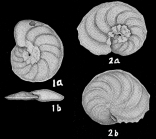WoRMS taxon details
Hanzawaia Asano, 1944
112151 (urn:lsid:marinespecies.org:taxname:112151)
accepted
Genus
Hanzawaia nipponica Asano, 1944 (type by original designation)
Nonionina d'Orbigny, 1826 · unaccepted (Suppressed by ICZN Opinion 1568)
- Species Hanzawaia basiloba (Cushman, 1918)
- Species Hanzawaia boueana (d'Orbigny, 1846)
- Species Hanzawaia bubnanensis McCulloch, 1977
- Species Hanzawaia concentrica (Cushman, 1918)
- Species Hanzawaia convexa He, Hu & Wang, 1965
- Species Hanzawaia densativa McCulloch, 1977
- Species Hanzawaia distincta McCulloch, 1977
- Species Hanzawaia grossepunctata (Earland, 1934)
- Species Hanzawaia hamadaensis Asano, 1951
- Species Hanzawaia lucida Saidova, 1975
- Species Hanzawaia mexicana Lankford, 1973
- Species Hanzawaia neobasiloba McCulloch, 1977
- Species Hanzawaia neoconcentrica McCulloch, 1977
- Species Hanzawaia nipponica Asano, 1944
- Species Hanzawaia nitidula (Bandy, 1953)
- Species Hanzawaia ornata Le Calvez, de Klasz & Brun, 1971
- Species Hanzawaia philippinensis McCulloch, 1977
- Species Hanzawaia pilasensis McCulloch, 1977
- Species Hanzawaia rhodiensis (Terquem, 1878)
- Species Hanzawaia solei Colom, 1957
- Species Hanzawaia strattoni (Applin, 1925)
- Species Hanzawaia strattoniformis McCulloch, 1981
- Species Hanzawaia tagaensis Asano, 1949
- Species Hanzawaia turea Saidova, 1975
- Species Hanzawaia asterizans (Fichtel & Moll, 1798) accepted as Riminopsis asterizans (Fichtel & Moll, 1798) (Type species of Riminopsis)
- Species Hanzawaia bertheloti (d'Orbigny, 1839) accepted as Discorbinella bertheloti (d'Orbigny, 1839)
- Species Hanzawaia coronata (Heron-Allen & Earland, 1932) accepted as Colonimilesia coronata (Heron-Allen & Earland, 1932)
marine, brackish, fresh, terrestrial
recent + fossil
Asano, K. (1944). Hanzawaia, a New Genus of Foraminifera, from the Pliocene of Japan (Resume). <em>The Journal of the Geological Society of Japan.</em> 51(606): 97-99., available online at https://www.jstage.jst.go.jp/article/geosoc1893/51/606/51_606_97/_pdf/-char/ja
page(s): p. 98 [details] Available for editors [request]
[request]
page(s): p. 98 [details] Available for editors
Hayward, B.W.; Le Coze, F.; Vachard, D.; Gross, O. (2024). World Foraminifera Database. Hanzawaia Asano, 1944. Accessed through: World Register of Marine Species at: https://www.marinespecies.org/aphia.php?p=taxdetails&id=112151 on 2024-04-19
Date
action
by
2006-09-12 06:54:36Z
changed
Martinez, Olga
![]() The webpage text is licensed under a Creative Commons Attribution 4.0 License
The webpage text is licensed under a Creative Commons Attribution 4.0 License
original description
Asano, K. (1944). Hanzawaia, a New Genus of Foraminifera, from the Pliocene of Japan (Resume). <em>The Journal of the Geological Society of Japan.</em> 51(606): 97-99., available online at https://www.jstage.jst.go.jp/article/geosoc1893/51/606/51_606_97/_pdf/-char/ja
page(s): p. 98 [details] Available for editors [request]
[request]
original description (of Nonionina d'Orbigny, 1826) Orbigny, A. D. d'. (1826). Tableau méthodique de la classe des Céphalopodes. <em>Annales des Sciences Naturelles.</em> vol. 7: 96-169, 245-314., available online at http://biodiversitylibrary.org/page/5753959
page(s): p. 293 [details]
basis of record Gross, O. (2001). Foraminifera, <B><I>in</I></B>: Costello, M.J. <i>et al.</i> (Ed.) (2001). <i>European register of marine species: a check-list of the marine species in Europe and a bibliography of guides to their identification. Collection Patrimoines Naturels,</i> 50: pp. 60-75 (look up in IMIS) [details]
additional source Neave, Sheffield Airey. (1939-1996). Nomenclator Zoologicus vol. 1-10 Online. <em>[Online Nomenclator Zoologicus at Checklistbank. Ubio link has gone].</em> , available online at https://www.checklistbank.org/dataset/126539/about [details]
additional source Loeblich, A. R.; Tappan, H. (1987). Foraminiferal Genera and their Classification. Van Nostrand Reinhold Company, New York. 970pp., available online at https://books.google.pt/books?id=n_BqCQAAQBAJ [details] Available for editors [request]
[request]
additional source Revets, S. A. (1996). The generic revision of five families of Rotaliine Foraminifera - Part 2. The Anomalinidae, Alabaminidae, Cancrisidae & Gavelinellidae. <em>Cushman Foundation for Foraminiferal Research, Special Publication.</em> 57-113., available online at http://www.cushmanfoundation.org/specpubs/sp34.pdf [details] Available for editors [request]
[request]
additional source Holzmann, M.; Pawlowski, J. (2017). An updated classification of rotaliid foraminifera based on ribosomal DNA phylogeny. <em>Marine Micropaleontology.</em> , available online at https://doi.org/10.1016/j.marmicro.2017.04.002 [details] Available for editors [request]
[request]
page(s): p. 98 [details] Available for editors
original description (of Nonionina d'Orbigny, 1826) Orbigny, A. D. d'. (1826). Tableau méthodique de la classe des Céphalopodes. <em>Annales des Sciences Naturelles.</em> vol. 7: 96-169, 245-314., available online at http://biodiversitylibrary.org/page/5753959
page(s): p. 293 [details]
basis of record Gross, O. (2001). Foraminifera, <B><I>in</I></B>: Costello, M.J. <i>et al.</i> (Ed.) (2001). <i>European register of marine species: a check-list of the marine species in Europe and a bibliography of guides to their identification. Collection Patrimoines Naturels,</i> 50: pp. 60-75 (look up in IMIS) [details]
additional source Neave, Sheffield Airey. (1939-1996). Nomenclator Zoologicus vol. 1-10 Online. <em>[Online Nomenclator Zoologicus at Checklistbank. Ubio link has gone].</em> , available online at https://www.checklistbank.org/dataset/126539/about [details]
additional source Loeblich, A. R.; Tappan, H. (1987). Foraminiferal Genera and their Classification. Van Nostrand Reinhold Company, New York. 970pp., available online at https://books.google.pt/books?id=n_BqCQAAQBAJ [details] Available for editors
additional source Revets, S. A. (1996). The generic revision of five families of Rotaliine Foraminifera - Part 2. The Anomalinidae, Alabaminidae, Cancrisidae & Gavelinellidae. <em>Cushman Foundation for Foraminiferal Research, Special Publication.</em> 57-113., available online at http://www.cushmanfoundation.org/specpubs/sp34.pdf [details] Available for editors
additional source Holzmann, M.; Pawlowski, J. (2017). An updated classification of rotaliid foraminifera based on ribosomal DNA phylogeny. <em>Marine Micropaleontology.</em> , available online at https://doi.org/10.1016/j.marmicro.2017.04.002 [details] Available for editors
 Present
Present  Inaccurate
Inaccurate  Introduced: alien
Introduced: alien  Containing type locality
Containing type locality
From editor or global species database
Diagnosis Test trochospiral, planoconvex, whorls enlarging rapidly, chambers numerous, sutures thickened and strongly curved back at the periphery, convex side involute with clear central umbilical boss, flattened side partially evolute, umbilical apertural flap from each chamber extending over the umbilical region and chambers of earlier whorls, successive flaps may coalesce over the entire umbilical area, periphery subangular and may be carinate; wall calcareous, optically granular, moderately coarsely perforate but with clear nonperforate area above the aperture and nonperforate umbilical flaps, thickened sutures, and peripheral keel; aperture interiomarginal and equatorial, against the periphery of the previous whorl and extending slightly onto the involute side but continuing beneath the umbilical flaps on the flattened side, supplementary openings present at the inner and outer margins of the umbilical flaps. Oligocene to Holocene; cosmopolitan. (Loeblich & Tappan, 1987, Foraminiferal Genera and Their Classification) [details]
To European Nucleotide Archive (ENA)
To Genbank
To Mikrotax (Nonionina) (from synonym Nonionina d'Orbigny, 1826)
To ITIS
To Genbank
To Mikrotax (Nonionina) (from synonym Nonionina d'Orbigny, 1826)
To ITIS
From editor or global species database
Hosted externally, from synonym

